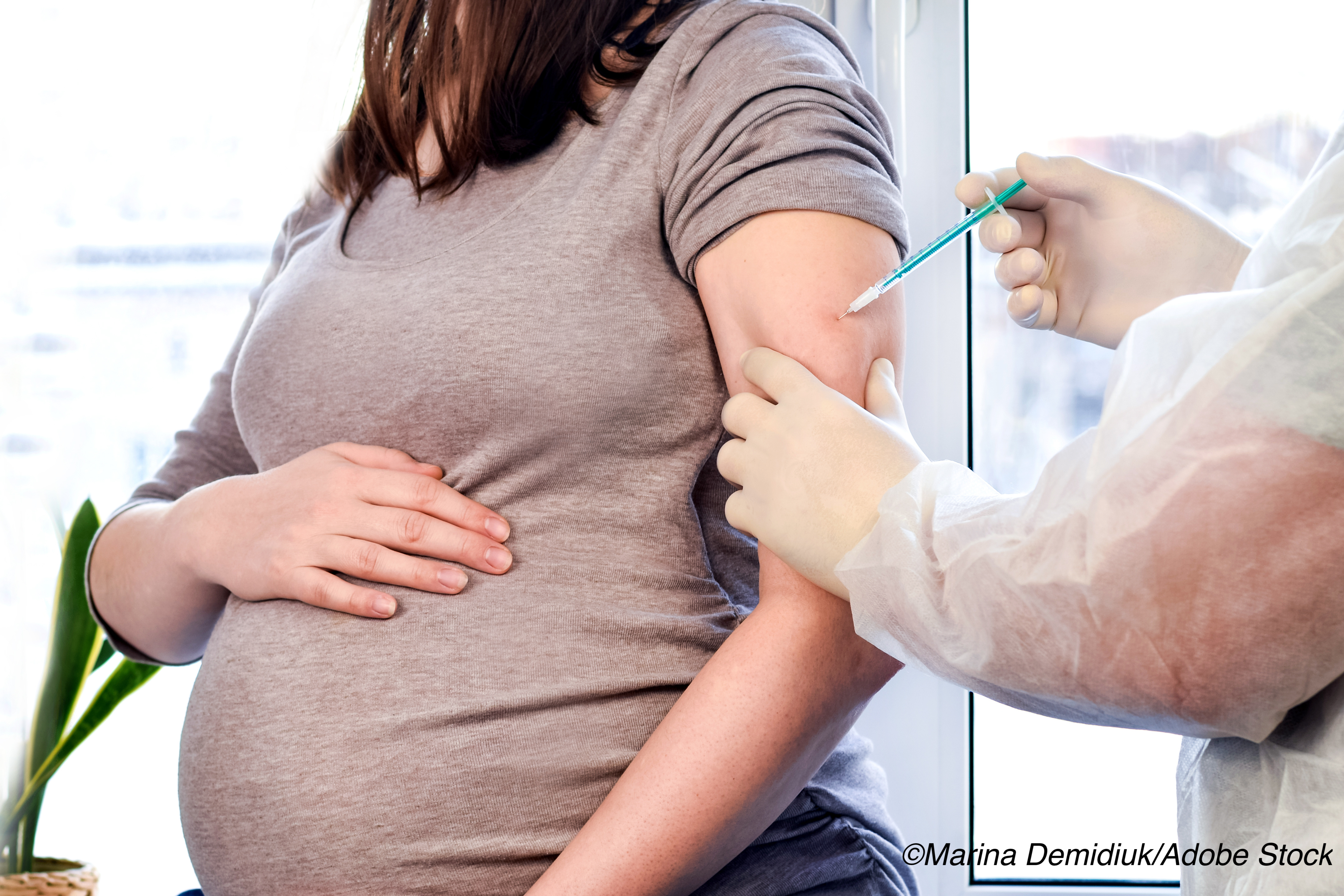
Influenza vaccination during pregnancy was not significantly linked with an increased risk of adverse early childhood health outcomes, researchers from Canada reported.
In a population-based cohort study with mean follow-up of 3.6 years, there was no significant association between mom getting the flu vaccine and multiple adverse outcomes, according to Deshayne B.Fell, PhD, of Children’s Hospital of Eastern Ontario Research Institute in Ottawa, Ontario, and co-authors.
They reported the following in JAMA:
- Childhood asthma: incidence rate 3.0 versus 2.5/1,000 person-years for a difference of 0.53/1,000 person-years (95% CI −0.15 to 1.21), adjusted hazard ratio 1.22 (95% CI 0.94 to 1.59).
- Neoplasms: IR 0.32 versus 0.26/1,000 person-years for difference of 0.06/1,000 person-years (95% CI −0.16 to 0.28, adjusted HR 1.26 (95% CI 0.57 to 2.78).
- Sensory impairment: IR 0.80 versus 0.97/1,000 person-years for a difference of −0.17/1,000 person-years (95% CI −0.54 to 0.21), adjusted HR 0.82 (95% CI 0.49 to 1.37).
The patient population for the retrospective cohort study consisted of 28,255 children (49% female; 92% born at 37 weeks’ gestation), 36.2% of whom were born to women who received seasonal influenza vaccination during pregnancy, and the authors pointed out that the “results remained largely consistent in trimester-specific analyses and in sensitivity analyses that considered possible residual confounding… changes in the gestational age definition, and implementation of trimming methods to account for possible influential inverse probability of treatment weights.”
They also noted that earlier studies have focused on influenza A (H1N1)pdm09 vaccination exposure in pregnancy, so “this study… makes an important contribution to long-term evaluation of seasonal influenza vaccination during pregnancy.”
With the addition of the Canadian data to those from other countries—Mali, Nepal, South Africa, and Bangladesh—the “data supporting benefits and safety of maternal influenza vaccination during any gestational stage are now abundant,” noted Manish Patel, MD, of the National Center for Immunization and Respiratory Diseases at the CDC in Atlanta, and co-authors in an editorial accompanying the study.
On top of that, global policies in favor of maternal influenza vaccination, such as those from the World Health Organization, “have been in place for a decade,” Patel’s group explained. Yet uptake has lagged behind, even in developed nations—in the U.S., for instance, vaccination coverage among pregnant women was 61% during the 2019-2020 influenza season, they wrote.
Clearly, more needs to be done to remove barriers to maternal flu vaccination, particularly in low-income countries where supplies and access can be limited while associated costs can be high, they said. In high-income countries, a strident anti-vaccination movement, and the increasing politicization of vaccination, throw up additional hurdles to maternal vaccination.
The authors used a birth registry linked with health administrative data that covered all live births in Nova Scotia, Canada, between October 2010 and March 2014. Follow-up was done through March 2016. They controlled for maternal medical history and used inverse probability of treatment weighting was used to control for potential confounders.
The childhood outcomes that were evaluated were immune-related, non–immune-related, and nonspecific; all were measured from emergency department (ED) and hospitalization databases.
More than 93% of the children were followed up to the end of the study period, ranging from a minimum of 2 years to a maximum of 5.5 years. Fell and co-authors found that children with exposure to flu vaccination were more likely than unexposed children to be born to mothers who were ages ≥35 (17.8% vs 16.6%) and nulliparous (48.3% vs 44.4%) with a preexisting medical condition, such as pulmonary disease (8.3% vs 6.5%) or asthma (8.0% vs 6.2%), and a family physician attending their delivery (52.9% vs 40.3%). They also were less likely to be born to mothers who were current or former smokers (16.2% vs 21.6%) and born within the lowest neighborhood mean family income quintile (17.6% vs 21.3%), they added.
The authors reported the following for a lack of association between maternal flu vaccination in pregnancy and outcomes in early childhood:
- Infections: IR 184.6 versus 179.1/1,000 person-years for a difference of 5.44/1,000 person-years (95% CI 0.01 to 10.9), adjusted incidence rate ratio (IRR) 1.07 (95% CI 0.99 to 1.15).
- Urgent and inpatient health services utilization: 511.7 versus 477.8/1,000 person-years for a difference of 33.9/1,000 person-years (95% CI 24.9 to 42.9), adjusted IRR 1.05 (95% CI 0.99 to 1.16).
Study limitations included the fact that some of the data was based on patient self-report, the potential for outcome misclassification, and diagnoses limited to those made in EDs and in the hospital.
However, the findings are in line with those from previous studies from Denmark, Sweden, and Canada, Fell and co-authors noted, and their study “used a population-based design that included nearly all births in the province, which minimized selection bias and could therefore potentially generalize to other settings.”
Patel’s group cautioned that the mild flu season in 2020-2021 because of Covid-19 pandemic control measures could mean that “pregnant women might not have antibodies that could protect their infants from increased risk of infection and severe illness during the next influenza epidemic. Efforts are needed now to encourage maternal influenza vaccination worldwide and to act on the compelling efficacy and safety data.”
-
Maternal influenza vaccination during pregnancy was not significantly associated with the risk of immune-related health outcomes, non–immune-related outcomes, or nonspecific health outcomes, such as emergency department visits or hospitalizations.
-
The data add to previous research supporting benefits and safety of maternal influenza vaccination during any gestational stage.
Shalmali Pal, Contributing Writer, BreakingMED™
The study was funded by the Canadian Institutes of Health Research.
Fell reported no relationships relevant to the contents of this paper to disclose. Co-authors reported support from, and/or relationships with, Pfizer, GlaxoSmithKline, Hoffmann La-Roche, the Foundation for Influenza, Seqirus, the NIH, and CANImmunize.
Patel and co-authors reported no relationships relevant to the contents of this paper to disclose.
Cat ID: 191
Topic ID: 83,191,730,30,31,191,41,138,192,561,924,925

